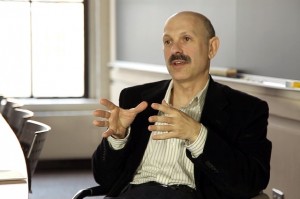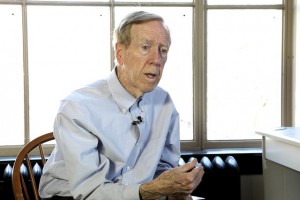Computer Networks in the Soviet Union
MIT Lecturer Vyacheslav Gerovitch on the idea of optimizing the Soviet economy with a computer network, the te...
By which principles one can arrange information? Can lirbary cards be called a wise decision in oredering the data about books? Senior Researcher at Harvard’s Berkman Center For Internet & Society David Weinberger speaks on what you will find during search for “Call me Ishmael”.
We’ve assumed that to know what something is is to know it’s place in the order of the universe, a perfect order in which everything has a place and only one place and one right place. That is not helpful assumption. We got to that because when you are organizing physical objects whether it’s books in a library or it’s spices in the kitchen you have to make decision about a single principle of organization. So if you want to organize your books alphabetically but your spouse wants to do it by topic, only one of you can win, you cannot do both, If you one organize spices by area of the world and your spouse what to do it by is it a hot spices, a savory — only one of you can win.
You create a physically independent set of meta-data. The classic example are catalog cards for library which some of us remember, most of us do. Paper cards each one representing a book and if you do that you can now have three cards for every book, so you have three principles of organization and so people can look up the book by author alphabetically, they can look it up by subject alphabetically, they can look it up by title alphabetically and that’s three orders put on top. But in order to do that for the second order of organization you have to reduce the amount of information, in case of a book, to what fits on a single card because otherwise you would have card catalog that is as big as a library and that isn’t helpful.
When you looked up a book in library, you looked up the meta-data, you know, you looked at the author’s name it was meta-data that would get you to the book, you know, that that’s how the second order works. But now everything is becoming digital, that’s an overstatement, but it’s pretty much true, everything is becoming digital. The distinct between meta-data and data really doesn’t hold up anymore. So now if you go to Google Books, for example, you can look up meta-data in the standard way but if you know the author’s name and you want to find out what the book was, you type in the author’s name and you get the book back, you don’t just get the meta-data back by the way, you get back the book as long as its licenses work.

MIT Lecturer Vyacheslav Gerovitch on the idea of optimizing the Soviet economy with a computer network, the te...

Philosopher Dennis Bonnay on metamathematics, set theory, and the Gödel's theorem

Mathematician Gilbert Strang on eigenvalues of matrices, lessons with millions of students, and loss of person...